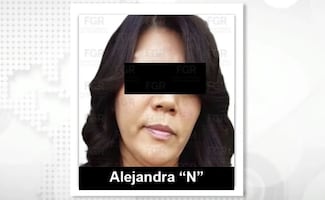Más Información

Confirman que cuerpo localizado junto a la UAEM es de Kimberly Joselin; Fiscalía asegura que no habrá impunidad

"El Mencho" tenía presentes a Los Alegres del Barranco; en cartas le hablaban del grupo musical que cantaba su corrido

Dan 108 años de prisión a Alejandra “Candela” por delitos de secuestro; está ligada al grupo criminal “Los Rojos”

SCJN niega amparo a Walmart para tener 0% de IVA en todos los productos menstruales; argumenta “ventaja indebida en el mercado”
Civil society organizations
are an example of participative citizens who are interested in public life . In the last decade, non-governmental organizations focused on humanitarian, social, or cultural projects emerged all over the world, especially in developing countries. All these organizations aim to change their environment in order to achieve social welfare. Their work is often recognized for representing a space different from the government, without bureaucracy and with no interest in building a clientele. Aid, cooperation, and solidarity are always at the center of their actions.
United Nations
even recognizes the work carried out by NGOs and builds relationships with them and includes them in the development and execution of social projects . In Mexico , NGOs have had a relevant role, since in many cases, they carry out tasks in areas where the government is absent.
In Mexico , as well as in other countries, the government allocates financial resources to finance the projects designed by NGOs but in 2019 the situation has changed: the federal government cut all the resources for civil society organizations . In 2018 , the Mexican government allocated MXN $6,200 million for the NGOs and over 2,656 organizations had access to these resources, out of the 22,000 NGOs in the country.
Yesterday, EL UNIVERSAL revealed that the operation of many of them is at risk and that many of them are trying to survive by selling condoms, organizing concerts, or teaching workshops.
On Tuesday, President López Obrado r explained that the cuts were the result of corruption acts. He explained that there are cases in which the leader of an NGO receives a salary, travel expenses, and advisers, all of this at the expense of public funds.
It would be enough to take legal action against the organizations involved in corruption acts, in order to stop the misuse of public funds . That every organization has to pay for a few corrupt ones doesn't seem to be a good decision. The President said that not all NGOs are the same but there isn't a strategy to keep financing the organizations yet.
No one would be against cutting public resources in the cases where it has been documented that the NGOs diverted money or when organizations conceal the way in which they spend the resources. It is also reprehensible that organizations hide behind the NGO mask to receive public resources and transform it into a modus vivendi . It is important to remember that this is not a general practice. If the lack of resources causes the extinction of transparent organizations, the country could lose something more valuable than the money allocated to NGOs .
gm
Noticias según tus intereses
[Publicidad]
[Publicidad]











